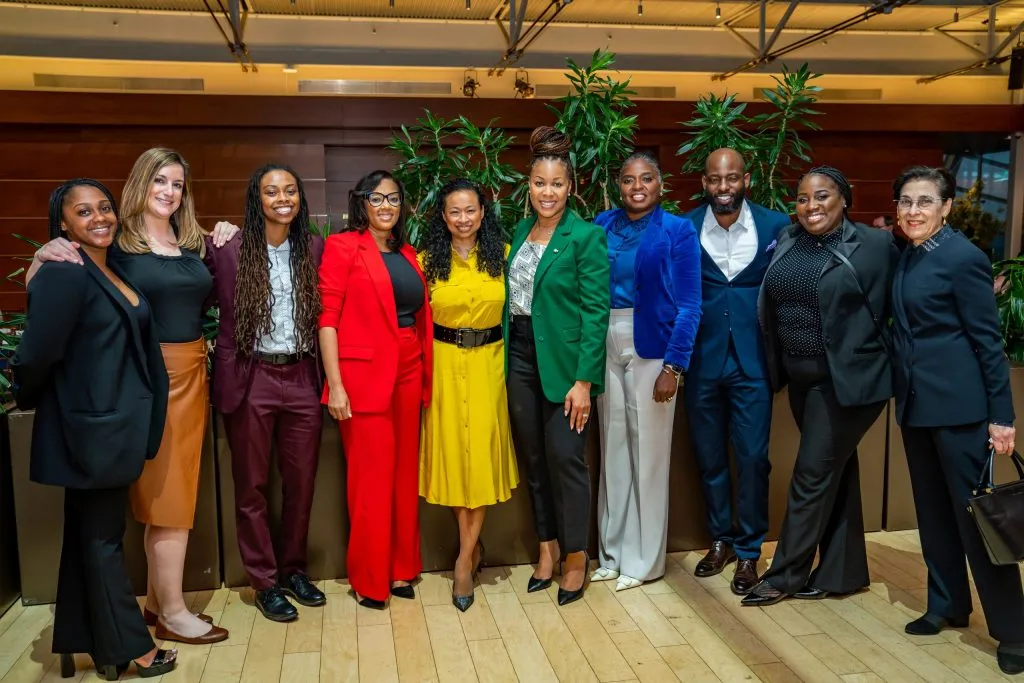
Dinner with a Decision Maker: Dalila Wilson-Scott
Dalila Wilson-Scott, Executive Vice President and Chief Diversity Officer of Comcast Corporation and President of the Comcast NBCUniversal Foundation, enlightened guests with anecdotes and pearls of wisdom about life, leadership, and executing a vision as part of the Neubauer Fellowship in Educational Leadership’s Dinner with a Decision Maker event, held February 15, 2023, in the Kimmel Center’s Hamilton Garden.
The Dinner with a Decision Maker event series provides opportunities for Fellows to learn from various industry leaders who speak from their experiences of leading during real-life situations and challenges, bringing to life Philadelphia Academy of School Leaders’ Leadership Levers—specific competencies that correlate with success.
Throughout the evening, which featured interviewers Nichole “Nikki” Polk, Principal of Potter-Thomas School and 2022 Neubauer Fellow, and Kelly Espinosa, Principal of Fanny Jackson Coppin School and 2020 Neubauer Fellow, Wilson-Scott discussed her approach to integrating diversity, equity, and inclusion into the workplace and community, the importance of maintaining a sense of purpose, and creating an environment that sets up contributors for success.
Diversity, Equity, and Inclusion and Community Impact
“The culture you want to create is one where DE&I [diversity, equity, and inclusion] is everybody’s job,” said Wilson-Scott. “If it’s only your job, it won’t happen. Make sure that everyone sees DE&I as our collective issue, our collective failure, and our collective success.” Inclusion can be a good place to start, she explained. “Everyone has felt excluded at some point, and no one wants to feel excluded again. Make inclusion an entry point for everyone.”
Wilson-Scott oversees all DE&I initiatives and philanthropic strategy for Comcast, with a recent focus on Project UP (which stands for Unlimited Possibilities), Comcast’s $1 billion commitment to advance equity by connecting people to the internet, advancing economic mobility, and opening doors for the future generation in the workforce.
As a leader deciding how to approach DE&I and community impact strategy, Wilson-Scott said you want to ask: “What’s a major issue that’s affecting a lot of people that we are uniquely positioned to address? I always say our three best assets at Comcast are our talent, our technology, and our reach. If I took all those assets and put them behind a large-scale societal issue, we will have a good chance of solving it. For us, that issue is digital equity.”
With 92% of today’s jobs requiring baseline digital skills, digital skillsets have a big impact on economic potential. Through Project UP, Comcast is helping people advance beyond baseline skills and evolve their skillsets for the world that’s coming, so that everyone can realize their full potential.
“We think beyond connectivity,” said Wilson-Scott. “How do we help people access roles where they can fully participate in the digital economy? Connectivity and adoption are step one. The second piece is skill,” she continued, emphasizing a focus on skills training for in-demand jobs with a “career pathway.”
Sense of Purpose
“Remind yourself what you’re here for,” said Wilson-Scott. “If I’m going to be here [at work], and not do all the things I should be doing personally, with my family, with my kids, I should be able to bring some purpose to that—bigger than my job, bigger than impacting just me and the immediate people around me.”
Maintaining this sense of purpose also helps to keep Wilson-Scott balanced, she said. “I find solace in my protected alone time where I can practice mindfulness, and quiet some of the noise—both the noise I create for myself and noise I hear from others. I remind myself what really matters.”
Creating a Culture of Success
For Wilson-Scott, leadership is about motivating people around a vision and creating an environment in which people can thrive, develop solutions, and deliver on that vision.
“Great ideas come from everywhere, and nothing great is executed alone,” said Wilson-Scott. “Remember when setting or sharing a vision, it’s OK to be wrong. Accept that early on. What you want to build muscle for and resilience for is testing your vision. If you can’t answer the challenges to your vision, your vision needs to be changed.”
Soliciting feedback to test your vision is how a leader builds buy-in. “People will get on board—even if they disagree with your strategy—if they can trust and validate your process by being honest about how you got there,” said Wilson-Scott. “When you’re vulnerable and honest about where you are and where you’re not, people can help provide solutions. Soliciting feedback is a two-way process,” said Wilson-Scott.
Part of achieving success with any initiative is establishing a vision, but “You have to give away control of the execution,” Wilson-Scott explained. “Think about the outcome that you want and recognize that there are multiple pathways to get there. Leaders create the environment in which people come up with ideas.
“Any great leader understands the plan gets informed as you go. High-performing people need space, they need autonomy, they need support when they fail, and they need accolades when they succeed. Create the environment where it’s OK for people to actively challenge each other, but manage that friction so everybody can see the greater outcome on the other side.”
Many attendees appreciated Wilson-Scott giving voice to so many important aspects of leadership. “As a leader, you have to see everyone,” said Rodney Johnson, Principal of John Moffett School, a 2022 Neubauer Fellow, and one of the event facilitators. “Everyone deserves a chance, everyone deserves an opportunity.”